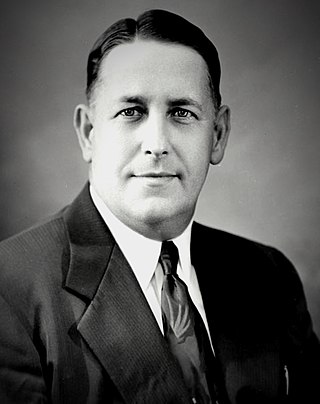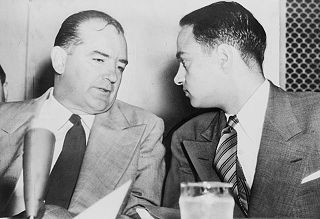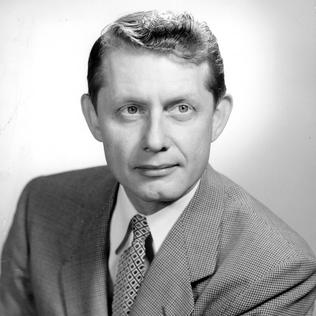Queer studies, sexual diversity studies, or LGBTQ studies is the study of topics relating to sexual orientation and gender identity usually focusing on lesbian, gay, bisexual, transgender, gender dysphoric, asexual, aromantic, queer, questioning, and intersex people and cultures.

Charley Eugene Johns was an American politician. Johns served as the 32nd Governor of Florida from 1953 to 1955.
"Gay agenda" or "homosexual agenda" is a pejorative term used by sectors of the Christian religious right as a disparaging way to describe the advocacy of cultural acceptance and normalization of non-heterosexual sexual orientations and relationships. The term originated among social conservatives in the United States and has been adopted in nations with active anti-LGBT movements such as Hungary and Uganda.

California Proposition 6, informally known as the Briggs Initiative, was an unsuccessful ballot initiative put to a referendum on the California state ballot in the November 7, 1978 election. It was sponsored by John Briggs, a conservative state legislator from Orange County. The failed initiative sought to ban gays and lesbians from working in California's public schools.

The Lavender Scare was a moral panic about homosexual people in the United States government which led to their mass dismissal from government service during the mid-20th century. It contributed to and paralleled the anti-communist campaign which is known as McCarthyism and the Second Red Scare. Gay men and lesbians were said to be national security risks and communist sympathizers, which led to the call to remove them from state employment. It was thought that gay people were more susceptible to being manipulated, which could pose a threat to the country. Lesbians were at less risk of persecution than gay men, but some lesbians were interrogated or lost their jobs.
William Armstrong Percy III was an American professor, historian, encyclopedist, and gay activist. He taught from 1968 at the University of Massachusetts Boston, and started publishing in gay studies in 1985.

Gay pulp fiction, or gay pulps, refers to printed works, primarily fiction, that include references to male homosexuality, specifically male gay sex, and that are cheaply produced, typically in paperback books made of wood pulp paper; lesbian pulp fiction is similar work about women. Michael Bronski, the editor of an anthology of gay pulp writing, notes in his introduction, "Gay pulp is not an exact term, and it is used somewhat loosely to refer to a variety of books that had very different origins and markets". People often use the term to refer to the "classic" gay pulps that were produced before about 1970, but it may also be used to refer to the gay erotica or pornography in paperback book or digest magazine form produced since that date.

The Florida Legislative Investigation Committee was established by the Florida Legislature in 1956, during the era of the Second Red Scare and the Lavender Scare. Like the more famous anti-Communist investigative committees of the McCarthy period in the United States Congress, the Florida committee undertook a wide-ranging investigation of allegedly subversive activities by academics, Civil Rights Movement groups, especially the NAACP, and suspected communist organizations.
During the 1960s, the United States underwent a sexual revolution. The revolution was a social and cultural movement that resulted in liberalized attitudes toward sex and morality. Social norms were changing as sex became more widely discussed in society. Erotic media, such as films, magazines, and books, became more popular and gained widespread attention nationally. Sex was entering the public domain.
This is a list of notable events in the history of LGBT rights that took place in the 1970s.

Save Our Children, Inc. was an American political coalition formed in 1977 in Miami, Florida, to overturn a recently legislated county ordinance that banned discrimination in areas of housing, employment, and public accommodation based on sexual orientation. The coalition was publicly headed by celebrity singer Anita Bryant, who claimed the ordinance discriminated against her right to teach her children biblical morality. It was a well-organized campaign that initiated a bitter political fight between gay activists and Christian fundamentalists. When the repeal of the ordinance went to a vote, it attracted the largest response of any special election in Dade County's history, passing by a more than 2-to-1 margin.

Harold Leland "Hal" Call was an American businessperson, LGBT rights activist, and U.S. Army veteran. He served as president of the Mattachine Society and in the 1950s, was one of the first gay activists to speak publicly on television. Call founded printing presses for LGBT publications and later opened gay adult shops and pornographic film screening venues. He received a Purple Heart for his service in the Pacific War.
President Dwight D. Eisenhower issued Executive Order 10450 on April 27, 1953. Effective May 27, 1953, it revoked President Truman's Executive Order 9835 of 1947, and dismantled its Loyalty Review Board program. Instead, it charged the heads of federal agencies and the Civil Service Commission, supported by the Federal Bureau of Investigation (FBI), with the task of investigating federal employees to determine whether they posed security risks. It expanded the definitions and conditions used to make such determinations. The order contributed to the ongoing Lavender scare of the mid-1950s, barring thousands of lesbian and gay applicants from government jobs.
Business nationalism is an economic nationalist ideology held by a sector of the political right in the United States.
This article concerns LGBT history in Florida.
Feminist views on sexuality widely vary. Many feminists, particularly radical feminists, are highly critical of what they see as sexual objectification and sexual exploitation in the media and society. Radical feminists are often opposed to the sex industry, including opposition to prostitution and pornography. Other feminists define themselves as sex-positive feminists and believe that a wide variety of expressions of female sexuality can be empowering to women when they are freely chosen. Some feminists support efforts to reform the sex industry to become less sexist, such as the feminist pornography movement.
Julia Penelope was an American linguist, author, and philosopher. She was part of an international movement of critical thinkers on lesbian and feminist issues. A self-described "white, working-class, fat butch dyke who never passed," she started what she called "rabble rousing" when she was a young woman.

Anti-LGBTQ curriculum laws are laws approved by various U.S. states that limit the discussion of sexuality and gender identity in public schools. In theory, these laws mainly apply to sex ed courses, but they can also be applied to other parts of the school curriculum as well as to extracurricular activities such as sports and organizations such as gay–straight alliances. In July 2022, a wave of anti-LGBT curriculum resurgence saw ten such laws beginning to take effect in six different states. Some states enacting these new laws appear to have mirrored similar laws from other states.
The Atlanta Public Library perversion case refers to a series of arrests made in September 1953 at the Atlanta Public Library in Atlanta, Georgia United States. The Atlanta Police Department, at the request of library officials, had set up a stakeout in the library's men's restroom via a one-way mirror and arrested 20 people on charges of sodomy over a period of 8 days. The incident was widely covered in the local newspapers.

In Nazi Germany, gay women who were sent to concentration camps were often categorized as "asocial", if they had not been otherwise targeted based on their ethnicity or political stances. Female homosexuality was criminalized in Austria, but not other parts of Nazi Germany. Because of the relative lack of interest of the Nazi state in female homosexuality compared to male homosexuality, there are fewer sources to document the situations of lesbians in Nazi Germany.










